

THIS IS GREAT! People who were involved in Black Power giving their opinion on it when interviewed later. What are your thoughts on the rise of the Black Power movement?
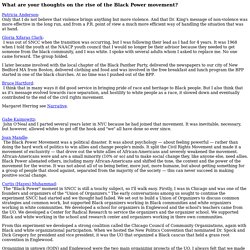
Patricia Anderson: Only that I do not believe that violence brings anything but more violence. And that Dr. King's message of non-violence was more effective in the long run, and from a P.R. point of view a much more efficient way of handling the situation that was at hand. Gloria Xifaras Clark: I was out of SNCC when the transition was occurring, but I was following their lead as I had for 4 years. I later became involved with the local chapter of the Black Panther Party, delivered the newspapers to our city of New Bedford MA from Boston, delivered clothing and food and was involved in the free breakfast and lunch program the BPP started in one of the black churches. Bruce Hartford: I think that in many ways it did good service in bringing pride of race and heritage to Black people. Margaret Herring see Narrative. Gabe Kaimowitz: John O'Neal and I parted several years later in NYC because he had joined that movement.
Jean Wiley: USEFUL TO READ but do not copy! Slightly different question to ours, but it explains all about the rise of Black Power. GCSE Bitesize: Why was it difficult for black Americans to gain equal rights in the USA in the 1950s and 1960s? Martin Luther King and the Movement - Gary Crystal. By: Garry Crystal - Updated: 12 Dec 2016| *Discuss Martin Luther King and the movement for civil rights in America are inextricably linked.
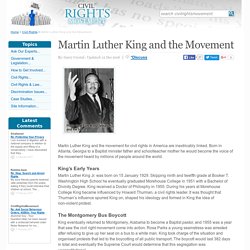
Born in Atlanta, Georgia to a Baptist minister father and schoolteacher mother he would become the voice of the movement heard by millions of people around the world. King’s Early Years Martin Luther King Jr. was born on 15 January 1929. The Montgomery Bus Boycott King eventually returned to Montgomery, Alabama to become a Baptist pastor, and 1955 was a year that saw the civil right movement come into action. Southern Leadership Christian Conference King was instrumental in forming the Southern Leadership Christian Conference (SLCC) in 1957.
The Birmingham Protests In 1963 America had reached boiling point where racial discrimination was concerned. The March on Washington I Have a Dream The March on Washington ended with Martin Luther King Jr’s famous “I have a dream” sermon. The Nobel Peace Prize You might also like... Dacaldha - 26-Jul-14 @ 5:10 PM ? Title: Non-violence Was Key to Civil Rights Movement - Chris Simkins. MONTGOMERY, ALABAMA— The success of the of the American Civil Rights Movement and the fight for racial equality in the United States is a testament to the determination of millions of African Americans who fought against discrimination in the 1960s.
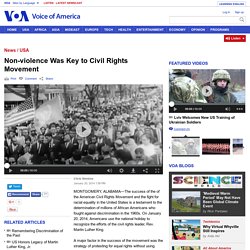
On January 20, 2014, Americans use the national holiday to recognize the efforts of the civil rights leader, Rev. Martin Luther King. What Did Martin Luther King Do to Progress the Civil Rights Movement? Martin Luther King, Jr. did many things to bring greater equality to America and to ensure civil rights for all people regardless of race.
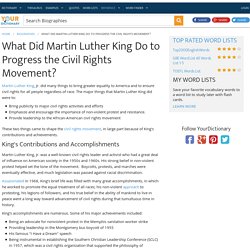
The major things that Martin Luther King did were to: Bring publicity to major civil rights activities and effortsEmphasize and encourage the importance of non-violent protest and resistance.Provide leadership to the African-American civil rights movement These two things came to shape the civil rights movement, in large part because of King's contributions and achievements. King's Contributions and Accomplishments Martin Luther King, Jr. was a well-known civil rights leader and activist who had a great deal of influence on American society in the 1950s and 1960s. King’s accomplishments are numerous. Black Power Movement - Blacks, Rights, Whites, and Civil. The Black Power movement grew out of the CIVIL RIGHTS MOVEMENT that had steadily gained momentum through the 1950s and 1960s.
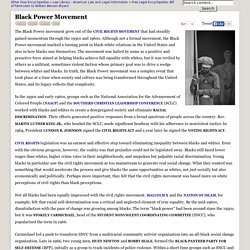
Although not a formal movement, the Black Power movement marked a turning point in black-white relations in the United States and also in how blacks saw themselves. The movement was hailed by some as a positive and proactive force aimed at helping blacks achieve full equality with whites, but it was reviled by others as a militant, sometimes violent faction whose primary goal was to drive a wedge between whites and blacks. In truth, the Black Power movement was a complex event that took place at a time when society and culture was being transformed throughout the United States, and its legacy reflects that complexity. CIVIL RIGHTS legislation was an earnest and effective step toward eliminating inequality between blacks and whites.
Even with the obvious progress, however, the reality was that prejudice could not be legislated away. MLK vs. Malcolm X - Melissa Boelstler. Between Malcolm X and Martin Luther King Jr., we have two huge advocates of the Civil Rights movement, but each had their separate ways of approaching the situation.
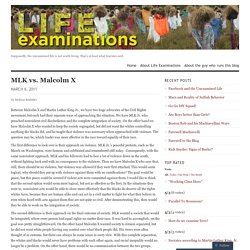
We have MLK Jr. who preached nonviolent civil disobedience and the complete integration of society. On the other hand we have Malcolm X who wanted to keep the society segregated, but did not want the whites controlling anything the blacks did, and he taught that violence was necessary when approached with violence. The question may be, which leader was more effective in the race toward equality of their race. The first difference to look over is their approach on violence. MLK Jr.’s peaceful protests, such as the March on Washington, were famous and celebrated and remembered still today.